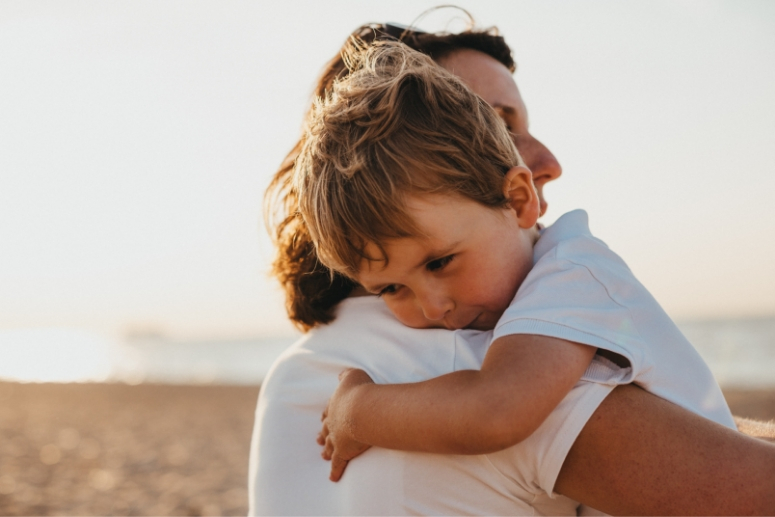
Being a parent is the most difficult and most rewarding job you will ever have. Having children is a perfect way to totally change your lifestyle and to feel overwhelmed all the time.
In my practice, I see worn out, overworked parents under huge pressure from all parts of their lives. We as people and parents need to have some down time to regroup, recover, and continue.
Below are five strategies to help you be a calmer, more peaceful and self-confident parent.
It is vital to talk to your spouse, partner, and other caregivers. You should discuss your basic styles of care and discipline to ensure fewer misunderstandings or blaming each other when stressors appear.
1. Everyone needs a little help now and then. Don’t be afraid to ask for it.
Babysitters can be expensive. And family members are not always around. Even if they are, they may not be available or even interested in helping out. So build a network of people who are nearby to take the pressure off when you need some adult time. Trading time with friends who have kids similar ages is a good way to keep the cost of childcare down. Spending time with your partner or on your own is important.
2. Everyone needs time off now and then. Plan for it and make it count.
Even an hour a week can upgrade your peace of mind if you do something you really look forward to and enjoy. A yoga class for instance? A beer with a friend? Trying out that new vegan food truck downtown with your significant other? There are many things as parents that we sacrifice. Our mental health and wellbeing shouldn’t be one of them. After a bit of me time, we are all better able to cope with the stresses in our lives. Everyone needs a time out and time to play.
3. Perfection is a goal that will only make you miserable. Let it go.
No one is a perfect parent. There are no perfect children. There, I said it. We get mad or feel overwhelmed. Making a concerted effort to be the best you can is all we can expect. Like all relationships, sometimes we learn from trial and error. Having little children choose their own bedtime, for example, isn’t good for anyone. Sometimes our children don’t like the rules we set or the things we ask. And that is fine. We are not meant to be their friends. Children need boundaries and that makes us parents unpopular.
4. Everyone has advice on how you should raise your children. You don’t have to take it or listen.
Free advice is worth exactly that: Nothing. Moreover, advice often comes with an investment or a point of view that may not be in your or your children’s best interest. Saying thank you and ignoring unsolicited advice is an acceptable way to handle these kinds of situations.
Find people who have similar parenting style to you and your partner. No comparing is allowed because each child grows and develops at their own rate. As long as you have checked everything out medically and your child is healthy, then let them be. People lie. Or they don’t remember exactly when their children did what. So don’t listen. Children will walk and talk and be potty trained before first grade. Some sooner and some later. But comparing only produces anxiety, which children feel. One of the best things we can do for our children is to love and support them. Help them develop by taking the pressure off.
5. Trust your intuition.
The yardstick by which people measure if a child is sick or not should be your own. It’s no one else’s business except for your doctor and other trusted advisors. Remember you know your child better than anyone else does. By the time your child is 10, they will have contracted 100 viruses. One of the best indicators of how sick a child is is their temperature and then their temperament.
Some of those viruses will need to be treated with medication, some of them will not. So learn the signs of illness from your own child. Often children misbehave or throw tantrums when they are not feeling well. Depending on their age and communication ability, they may not be able to tell you they are ill. So watch for the signs and have a working thermometer handy.
Immunize your children. We are seeing an increase in diseases that, until recently, had almost entirely been eradicated. Have belief in your own abilities to nurture your children.
A lot of being a parent is showing up and paying attention. Making sure your child feels love even when one of you is angry. (Tweet it!)
No one likes to be criticized or to feel that someone they love is being critical. You can say something one hundred times, showing your child kindness and compassion by example can be more powerful.
Coaching with Tamara Mendelson
Are you struggling through an unexpected life change? I’m now taking applications for 2019 Coaching and I’d love to hear from you! Sign up below to receive my coaching application form straight to your inbox.
[magicactionbox id=1256]
You are a good parent. The only way to know that is by looking inward. Every parent struggles. And if someone tells you that things are always fine, they are lying. Parenting is hard but it makes you appreciate the little things, even if that little thing is locking yourself in the bathroom with a cup of coffee. Or a hug when you need it the most. And so do they.
Be kind to yourself.
Now over to you: What do you think is the hardest and best part about being a parent?



